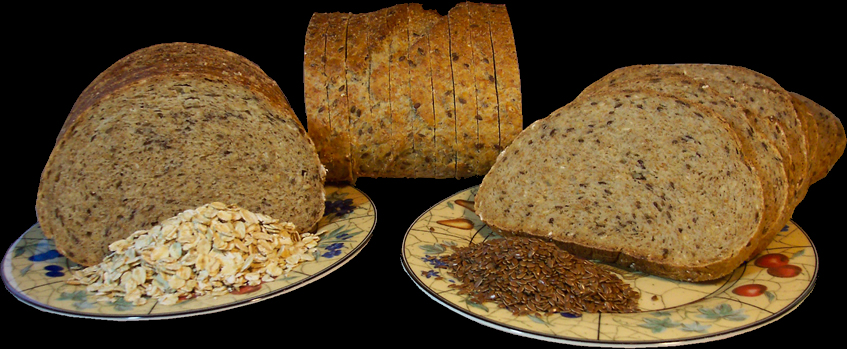
The issue of enzymes in bread making hits the heart of modern baking practices. Enzymes are catalysts that make things happen - may it be fermentation in bread making, metabolism in our body, or all living things having some sort of enzymatic activity. The word 'enzyme' comes from the Greek word 'enzymos', which means 'leavened' or 'fermented'. Our ancestors believed that the secret of life, the difference between living and nonliving entities, was a certain "vitality". This is why the changes taking place in fermented foods were considered almost magic - that they possessed that special vitality. Some common examples are grapes making wine, milk transforming into cheese, grain ground and baked into bread. Native enzymes that were historically involved in these fermentation processes have been virtually eliminated in these foods and partially substituted by artificial monoculture strains or chemical additives. This is to gain total control of the operation to facilitate the mass production in today's food industry.

To elaborate a little, the production of traditional foods has changed drastically over the past 50 to 100 years and modern breads have totally lost their historic identity. Population growth coupled with the ever more sophisticated technological advancements in modern times have allowed, or made possible, the mass production of highly processed foods. This required control over the complex and misunderstood natural occurring procedures, but the exact lack of understanding and respect for these procedures has lead us to modern, unhealthy, baking practices. The unpredictable nature of natural fermented products and their unyielding stubbornness to become conveniently mass produced products eventually led to today's streamline synthesized foods that are nicely displayed on the shelves of grocery stores, stackable and tamed.

There are two things that the modern food industry does not tolerate: variances in production characteristics that cannot adapt to an automated system of mass manufacture, and the reliance on skilled professionals required in the manufacture of the products that will vary.

There are three things that challenged a baker to making bread indigestible, edible, or outstanding in the past: the year's harvest, the skill of the miller, and the final skill of the baker. It became relatively quickly apparent to industrial entrepreneurs that these three factors needed to be controlled in order to facilitate mass production in a factory setting. The need for absolute control was a necessity similar to today's global stage.

Firstly, the need to control the quality of the ingredients is required. This is Consistency, which is now achieved through our modern agricultural practices. Secondly, the modern milling processes get rid of the sources of the microbial activities: bacteria, enzymes, etc. This is accomplished by eliminating the germ in the kernel and by the excess heat that is created through the friction existing in modern milling technologies. This leaves a virtually sterile or dead ingredient (flour) that can be worked with conveniently. Now the raw ingredient can be tailored to the exact requirements by introducing artificial chemicals or monoculture ingredients (bakers yeast) to facilitate the production of huge amounts possible in today's manufacturing plants. Total control is important. It doesn't matter to producers if it is healthy or not for the consumer. The list of the various allowable chemical additives is long and the possible health implications of most of these chemicals have not been determined for the long term at all. They continue to do research on them, and slowly ban numbers of the chemicals in use that have been found to harm us over continuous exposure. One of the recent chemicals is Potassium Bromate, a dough conditioner. However, we can see that this isn't healthy for us: we are consuming chemicals (unnatural) in the composition of these modern, artificial breads, and it is harming us! The damage that they do beforehand must be considerable, else the chemical wouldn't be banned in the first place. With the new fad of "Ready Bake" frozen breads it becomes even more dangerous as to the content of these products. The additives that are used are of dubious origin - to say the least - and again the health of the end consumer is compromised, when these dangerous additives are coupled with unscrupulous mass production.

Of course, even in these breads enzymes are still required and these are added to the dough and run under "General Dough Condition" and are alpha-amylase (crumb softeners), fungal protease (gluten conditioner), and lipoxygenase (gluten strengthener). You will not find these so-called 'minor ingredients' listed in the ingredient labels of the products.

Another natural occurring ingredient is destroyed through the modern milling techniques: the vitamins. Modern flour needs to be "artificially enriched", since we have found out that we can have deficiencies that can lead to certain diseases of malnutrition.

Through the Kaslo Sourdough Bakery's natural sourdough production and the partial fresh grinding of our own wheat into flour (where the germ is fully incorporated as well as all of the enzymes, vitamins, etc.), we believe that we have a much superior product that is very similar to the qualities of traditional bread, which has sustained us from the dawn of civilization. The natural blend of what Nature has bequeathed upon us in the way of traditional bread, left unaltered for the most part.

Playing God in such staple foods is irresponsible, and the outcome is sill undeterminable, but not unpredictable. Modern diseases are becoming rampant and the proverb of "You are what you eat." is even more valid then ever before.

|
